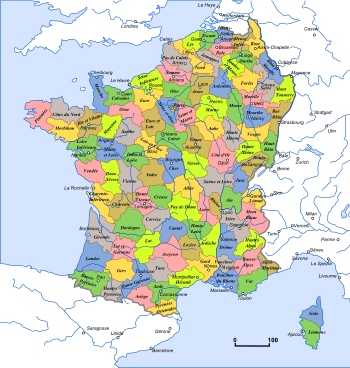French First Republic facts for kids
Quick facts for kids
French Republic
République française
|
|||||||||||||||
|---|---|---|---|---|---|---|---|---|---|---|---|---|---|---|---|
| 1792–1804 | |||||||||||||||
|
|
|||||||||||||||
|
Anthem: "La Marseillaise"
|
|||||||||||||||

The French Republic in 1801
|
|||||||||||||||
| Capital | Paris | ||||||||||||||
| Common languages | |||||||||||||||
| Religion |
|
||||||||||||||
| Government | 1792–1795 Authoritarian directorial republic
1795–1799 Oligarchical directorial republic 1799–1804 autocratic republic |
||||||||||||||
| President of the National Convention | |||||||||||||||
|
• 1792
|
Philippe Rühl (first) | ||||||||||||||
|
• 1795
|
Jean Joseph Victor Génissieu (last) | ||||||||||||||
| President of the Directory | |||||||||||||||
|
• 1795–1799
|
By rotation: 3 months duration | ||||||||||||||
| First Consul | |||||||||||||||
|
• 1799–1804
|
Napoléon Bonaparte | ||||||||||||||
| Legislature | Parliament | ||||||||||||||
| Council of Ancients (1795–1799) | |||||||||||||||
|
|||||||||||||||
| Historical era | French Revolutionary Wars | ||||||||||||||
| 14 July 1789 | |||||||||||||||
|
• Overthrow of Louis XVI
|
21 September 1792 | ||||||||||||||
|
• Committee of Public Safety and Reign of Terror
|
5 September 1793 to 28 July 1794 |
||||||||||||||
| 4 February 1794 | |||||||||||||||
| 24 July 1794 | |||||||||||||||
| 9 November 1799 | |||||||||||||||
|
• Napoleon Bonaparte is proclaimed emperor by the Senate
|
18 May 1804 | ||||||||||||||
| Currency | livre (to 1794), franc, assignat | ||||||||||||||
|
|||||||||||||||
The French First Republic was a period in French history when France was a republic, meaning it was governed by elected officials instead of a king. It began on 22 September 1792, after the French Revolution. During this time, the National Convention was formed, and the country went through many big changes.
The First Republic lasted until 1804. That's when Napoleon Bonaparte became emperor, starting the First French Empire. This period was full of important events. It saw the end of the monarchy, a time known as the Reign of Terror, and the rise of powerful new governments.
Contents
What Was the French First Republic?
The French First Republic was the first time France tried to be a republic. This meant the country was run by its citizens through elected representatives. It replaced the old system where kings ruled. This change happened because of the French Revolution, which started in 1789.
The Start of a New Era
The First Republic officially began on 21 September 1792. On this day, the National Convention took over the government. They decided to get rid of the king, Louis XVI, and declare France a republic. This was a huge step for the country.
The Reign of Terror
From 1793 to 1794, France went through a difficult time called the Reign of Terror. During this period, a group called the Committee of Public Safety had a lot of power. They tried to protect the new republic from its enemies. Many people who were thought to be against the revolution faced harsh consequences. This time ended in July 1794.
The Directory Takes Over
After the Reign of Terror, a new government was set up in 1795. It was called the Directory. This government was run by five directors. They tried to bring more stability to France. However, the Directory faced many challenges and was not always popular.
Napoleon's Rise to Power
The Directory lasted until 1799. That year, a famous general named Napoleon Bonaparte took control in an event called the Coup of 18 Brumaire. He set up a new government called the Consulate. Napoleon became the First Consul, which made him the most powerful person in France.
Napoleon slowly gained more and more power. By 1804, he was so powerful that he declared himself emperor. This marked the end of the French First Republic. It also began the First French Empire, with Napoleon as its ruler.
Important Changes and Ideas
During the First Republic, many important changes happened in France. One major change was the abolition of slavery in French colonies in 1794. This was a big step towards human rights.
The republic also promoted new ideas like "Liberty, Equality, Fraternity". These ideas were about freedom, fairness, and brotherhood for all citizens. They became the motto of France. The national anthem, "La Marseillaise", also became very important during this time.
See also
 In Spanish: Primera República francesa para niños
In Spanish: Primera República francesa para niños
 | Laphonza Butler |
 | Daisy Bates |
 | Elizabeth Piper Ensley |




